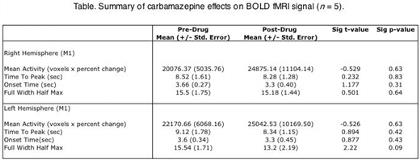ANTICONVULSANT EFFECTS ON FUNCTIONAL MRI SIGNAL CHARACTERISTICS
Abstract number :
1.093
Submission category :
Year :
2005
Submission ID :
5145
Source :
www.aesnet.org
Presentation date :
12/3/2005 12:00:00 AM
Published date :
Dec 2, 2005, 06:00 AM
Authors :
1Rahim Samji, 2Jodi Edwards, 2Bradley G. Goodyear, and 1Paolo Federico
Anticonvulsants are widely used medications. Carbamazepine, valproate, and phenytoin are common first line medications for focal and generalized seizures. Functional MRI (fMRI) has been used to explore brain function in epileptic patients, most of who are on anticonvulsants. However, no studies have explored possible interactions between anticonvulsants and the fMRI signal (blood oxygen dependant response, BOLD). We report preliminary results from our study of the effect of anticonvulsants on the BOLD response in patients with new onset seizures. We recruited anticonvulsant na[iuml]ve patients from our hospital requiring administration of carbamazepine, valproic acid, or phenytoin for new onset focal or generalized seizures (no more than three). Patients were excluded if they had a structural abnormality on MRI other than hippocampal sclerosis or if their presumed seizure focus was in the motor or pre-motor cortex, amongst other criteria. All patients completed an fMRI study prior to starting medication as well as four to six weeks later. Serum anticonvulsant levels were measured at the second scanning session. Event-related fMRI was performed at 3 T using a bilateral finger-tapping task (repeated three times). The following parameters were analyzed in both primary motor cortices (M1 and M2) for each study: mean activity (voxels x percent change), time to peak, onset time, and area under the BOLD response curve. Spearman[apos]s rank correlation coefficients were computed between pre- and post-anticonvulsant studies, and levels of the anticonvulsants. To date, five patients have been recruited. They all had temporal lobe seizures and were started on carbamazepine. No measurable differences in the aforementioned parameters were seen before and after starting carbamazepine. All patients tolerated the carbamazepine well and their serum levels were therapeutic at the time of the follow-up study. These preliminary data suggest that carbamazepine has no significant effect on BOLD fMRI signals measured in patients with epilepsy.[figure1] (Supported by Canadian Institutes of Health Research and Alberta Heritage Foundation for Medical Research.)
